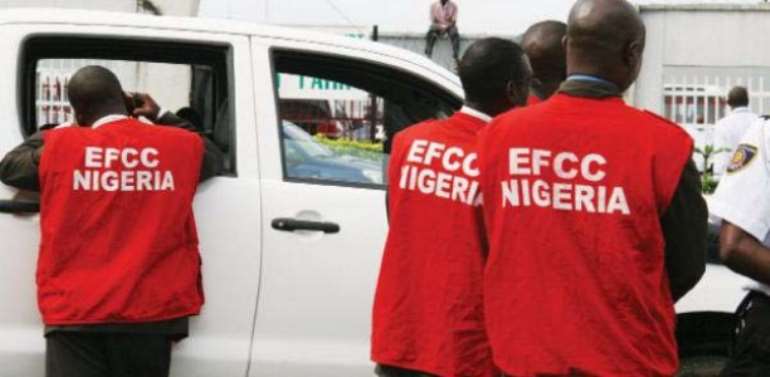Underfunding of EFCC - The Sun

Disconcerting signals are emanating from the Abuja headquarters of the Economic and Financial Crimes Commission (EFCC). The commission's secretary, Mr. Emmanuel Adegboyega, sounded the alarm when he told a public hearing of the Senate Committee on Drugs, Narcotics, Financial Crimes and Anti-Corruption that inadequate funding had almost crippled the commission, and is adversely affecting its fight against corruption. Adegboyega, who was addressing the lawmakers at the hearing for a bill for an Act to establish the Nigerian Financial Intelligence Agency (NFIA), revealed that as at the time he was speaking, the EFCC had lower than N2 million in its account.
According to the scribe of the anti-graft agency, the commission does not even have enough money to conveniently pay staff salaries for December, let alone fund other obligations. On top of all these, it is still expected to pay the lawyers who represent EFCC in courts in the course of prosecution of accused persons. He was unequivocal in his lamentation of the condition under which the agency operates.
Of course, news of the EFCC's precarious financial predicament is not new. Not too long ago, information leaked to the public that it was, indeed, the Central Bank of Nigeria (CBN) that was bankrolling the prosecution of the ex-bank chiefs arraigned by the EFCC. The commission simply did not have the funds to recruit a matching team to the intimidating team of Senior Advocates of Nigeria (SANs) assembled by most of the ex-bank bosses. It had to enter into a curious funding arrangement with the CBN.
One effect of this underfunding is that even in instances where convictions were obtained, and monies and assets recovered, large chunks of recovered assets were allegedly negotiated away to the prosecution lawyers as part-payment for their services. This, in turn, opened up another window for fraud.
The EFCC outcry over denial of funds lends weight to allegations that the President Goodluck Jonathan administration is deliberately frustrating the anti-graft war by withholding funds meant for the EFCC.
For an agency that is supposed to be fighting corruption, its present financial predicament is simply unacceptable. It is not in the interest of Nigeria that EFCC should be broke, cash-strapped or under-funded. This is more so considering that the agency and its operatives are entrusted with the job of bringing to book, criminals and fraud kingpins who are usually awash with cash. We would unwittingly be exposing EFCC operatives to undue temptation. They could be forced into taking money from such millionaire/billionaire criminals, and look the other way.
Similarly, the present paucity of funds at the EFCC further fuels the claims by critics that the Jonathan administration has not done enough in the the anti-graft war.
While we are of the view that government needs to pump necessary funds into the commission, and we urge the National Assembly to ensure that adequate funds are appropriated for EFCC, we also call for a proper auditing of the books of the agency. This is with particular reference to recovered funds and all foreign aids and grants that are regularly attracted into the agency.
Apart from monies regularly allocated to the commission by the federal government, the EFCC, because of the nature of its work, regularly attracts a lot of funding from foreign donor agencies. However, a lot of people, over the years, have expressed concern over how EFCC spends the grants and donations it gets. In some instances, critics have alleged that such grants have tended to become slush funds that can be easily frittered away by unscrupulous officials. which the leadership of the commission simply fritters away. At a particular point in its history, the commission's leadership simply used the funds to oil its political propaganda machine, in pursuit of causes outside the briefs of the agency.
So, we need to know: If the commission is broke, is it as a result of government failing to appropriate enough funds? Is government failing to release funds appropriated for the agency? Have the donations suddenly dried up? Or, is it that those who run the commission have muddled up their priorities and misapplied the funds?
It is not just enough to make a blanket statement that government is not adequately funding the EFCC, Adegboyega should have told the world the differential between what the commission demanded and what it actually got. Of course, we have had instances where the National Assembly slashed the budget proposals of the commission, but it is really nobody's fault if the EFCC is unable to defend its budget before the lawmakers, especially when it is known that it is in the interest of many of the politicians to clip the claws of the EFCC.
Irrespective of the shortcomings of those who run the commission, it is rather ominous for the EFCC to be broke. It sends the wrong signals to not only the Nigerian populace, but also to our development partners abroad. It clearly tells the rest of the world that we are not ready to fight this monster called corruption, which has dogged our development.
This government needs to demonstrate seriousness in fighting corruption by properly funding the EFCC and all other agencies charged with battling the graft cankerworm.
However, we hope that this now regular complaint of insolvency is not a mere excuse on the part of the commission to cover its unwillingness, ineffectiveness and incompetence in the fight against corruption.
